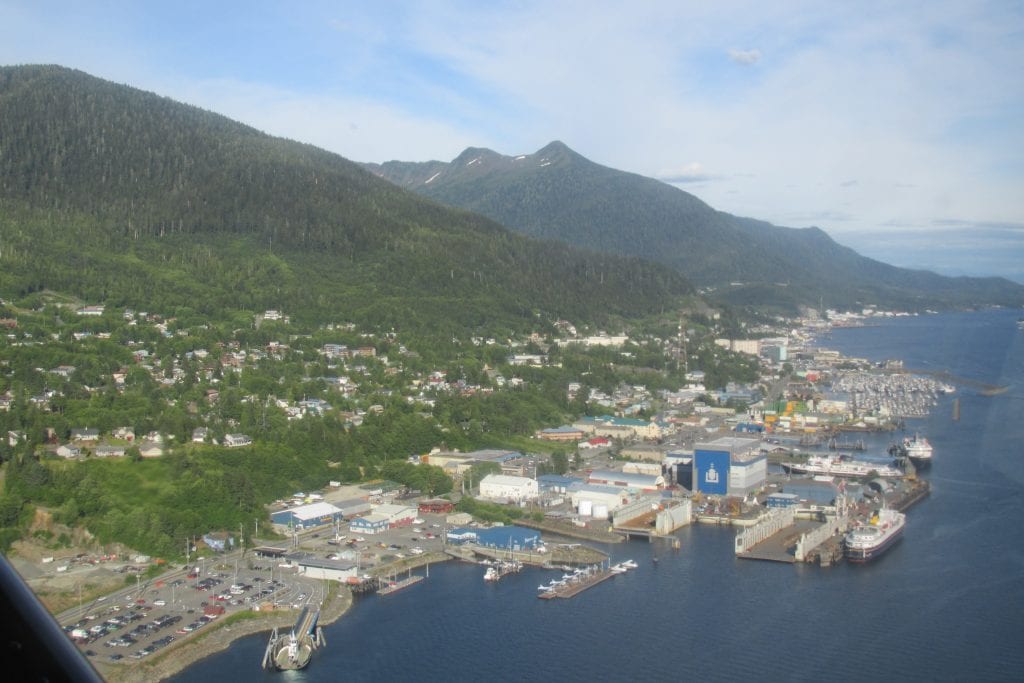
As of Friday afternoon, state health authorities say there are no confirmed coronavirus cases in Alaska. But local officials across the state are preparing for the virus to eventually arrive.
Ketchikan’s emergency manager updated city officials and the public on the city’s preparations for a possible outbreak Thursday.
Here in Ketchikan, Fire Chief Abner Hoage is in charge of coordinating the city’s response to the threat of a local outbreak of coronavirus.
He urged calm Thursday as he updated the Ketchikan City Council on local authorities’ preparations for the virus to arrive.
“You know, the public in general — not just in Ketchikan, but around the nation — is scared of this disease,” he said. “The scare is causing problems almost as significant as the disease itself.”
He emphasized that most cases of COVID-19 — that’s the name for the disease caused by the virus — aren’t severe. A study of more than 70,000 patients published last month by Chinese health officials found that about 80 percent of the cases examined were mild.
“The disease itself is similar to the cold or flu,” he said.
He emphasized that most people won’t need medical care.
Still, though, federal health officials say “older adults and people who have severe chronic medical conditions like heart, lung or kidney disease seem to be at higher risk.”
To address that risk, Hoage told the council that Ketchikan’s city and borough governments activated their joint emergency operations center in the last week of February. He said city staff are monitoring the situation while they implement new recommendations from the Centers for Disease Control , or CDC.
“We’ve already implemented 911 dispatch screening procedures, and EMS response protocols have been updated based on the guidance from the CDC,” he said. “Our response and our healthcare systems really are very ready to go.”
To prevent spreading the virus in city buildings, Hoage said his team was reviewing cleaning procedures and providing hand sanitizer in public places.
Hoage also said the city was also gearing up for higher levels of absenteeism among its more than 300 employees.
“Things like being able to do remote work, if we needed to isolate people and keep city operations and KPU operations running,” he said.
And though local stores haven’t been able to keep hand sanitizer on the shelves, soap works just as well, he said.
“The good news is soap and water is the first recommendation for how to prevent this, not hand sanitizer. Hand sanitizer is the backup method,” he said, referencing federal guidance from the CDC.
Federal health officials encourage everyone to wash their hands with soap and water for at least 20 seconds before eating — and after coughing, sneezing and using the bathroom, or touching public surfaces like hand rails and door knobs.
In addition, Hoage asked people who think they might be sick to stay home from work and school — and to think twice before showing up at the doctor’s office.
“If you think you have signs and symptoms of coronavirus, but you’re not in need of immediate medical care, you’re not having severe respiratory problems or some other issue that’s going to cause imminent death,” he said, “you should call your provider before you go to your doctor or the hospital.”
He said medical staff may be able to triage patients over the phone and determine whether further care is necessary without tying up limited medical resources.
“Every person that goes in and sees their provider without calling is going to take up the time of three or four providers — or maybe more — and lots of protective equipment in order to evaluate that,” Hoage said.
Hoage also said state officials are working on a plan to test residents for coronavirus in their homes, but he didn’t say when a program like that might be implemented.
Some questions remain unanswered — like what might happen if the virus is detected aboard a cruise ship heading for Alaska. KTOO Public Media has reported that the Coast Guard has the authority to turn away ships or close all ports in the region. And Juneau’s city manager told reporters that local governments could assume broad powers if they declare an emergency. City officials in Ketchikan have yet to address questions about that possibility here.
Ketchikan emergency managers will hold a media roundtable on Tuesday to answer more questions, and KRBD will be there. If you’ve got questions you want to see answered, email us at news@krbd.org.
And you can always find the most up-to-date information on the coronavirus at CDC.gov.





